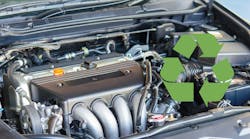The next five years will see immense change and growth within the commercial semi-trailer market in North America. The significant impact from the immense increase of diesel prices, operational costs and strengthening government regulation on the on-highway freight transportation industry has substantially amplified the interest and proliferation of advanced semi-trailer technologies, such as aerodynamics, electronic chassis systems, safety systems, telematics, as well as usage of enhanced body materials and part components.
Due to the recessionary environment over the past four years, fleets have forcibly postponed purchases of new equipment, which has extended the average age of semi-trailers to almost 8.5 years compared to 5 to 6 years before the recession hit. In turn, this has created a backlog of demand for replacement, as fleets now need new equipment and advanced technology.
The semi-trailer market saw strong demand in 2012 – approximately 248,000 units were produced, which was a 31,000 unit increase from 2011. As such, customers will be looking for innovative solutions to put more freight in semi-trailers in an effort to offset rising fuel prices and driver shortages.
"The proliferation of advanced semi-trailer technologies will be driven by three crucial factors: strengthening of the regulatory environment, rising fuel prices and an aging trailer population," said Frost & Sullivan Research Analyst Wallace Lau. "Compliance, Safety and Accountability (CSA) 2010 is also a particularly strong force behind the increase in demand for the upkeep of the technology and maintenance for semi-trailers. Fleets must comply with the stricter regulations, as they cannot risk being penalized or shut down due to poor CSA scores."
The Environmental Protection Agency (EPA) too has mandated that by 2014 heavy trucks must meet fuel efficiency standards. In addition to these constant regulatory pressures, the freight transportation industry continues to suffer from fleet downsizing, carrier failure, driver shortage and slow growth, all of which make it harder to recover their pre-recessionary peak levels.
Diesel fuel volatility and more regulations will lead to fleet managers and owner-operators pulling advanced technologies rather than OEMs pushing them. With increasing competition, all of these technologies have and continue to compete for the purchase dollars of fleet managers, which leads to certain segments growing at the expense of others.
"Fleets are looking towards advanced trailer technologies to enhance and optimize fleet productivity through the usage of telematics, safety systems (RSC, ATIS, TPMS), trailer aerodynamics, and chassis systems," noted Lau. "While OEMs can use advanced technologies to differentiate products from competitors, too many technologies chasing too few consumer dollars will make it difficult for OEMs to choose the right set of technologies for vertical integration."
Overall, advanced technologies that reduce the trailer form factor enable connectivity with fleet management hubs, improve trailer safety, reduce trailer downtime and seamlessly integrate with tractor technologies are becoming vital in catalyzing trailer design. Trailer OEMs and suppliers must use this trend to create new and potentially lucrative revenue streams.

